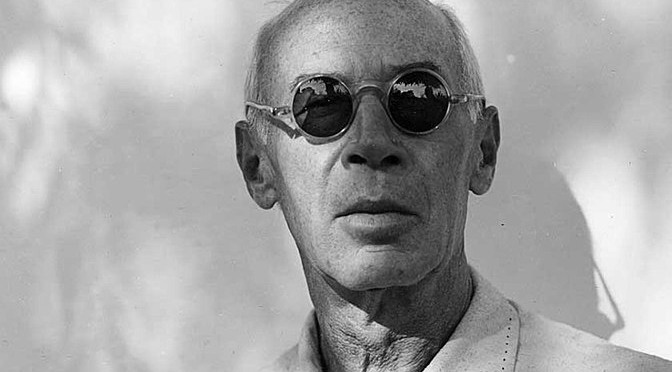What does Henry Miller say about writing erotic literature? He was a master of self-dramatization. His novels purport to be autobiographical but are full of exaggerations and invented episodes. Nevertheless, the author flashes through on every page, which is not least due to his writing style, which – as he himself once said – owes much to the Stream of Consciousness of the Surrealists. Or anticipated it, as he himself claims. I have taken a look at a few of the passages in which he deals with writing.
The place to write
In his novel Tropic of Capricorn, Henry Miller tells of a monstrosity of a table he rescued from his father’s tailor shop and set up in his Brooklyn apartment:
What kept me securely anchored was the great desk with its many drawers, which I placed in the living room … All the compartments and all the drawers were empty, nothing was on or in the desk, nothing but a sheet of white paper, on which I could not even draw little men.
(quoted from the Rowohlt TB edition of 1980, p. 266f)
This monstrosity in the middle of the living room, which comfortably accommodated twelve chairs, was to become the place of his literary activity. That is how he had thought of it. De facto, this highly symbolic relic from his father’s trove was witness to a major writer’s block.
Not that Miller didn’t have his first publications behind him at this point. He is talking here about “millions of words that I had written before, mind you, comprehensible, well-ordered, neatly arranged words.” Only: they no longer meant anything to him. Worse still:
Everything I had written so far belonged in the museum; that is the case with the majority of things that are written today, and that is why they do not ignite, do not set the world on fire.
(op. cit., p. 268)
The Stream of Consciousness
Miller says of himself that up to now he has written with his head, but that at that time he was far from a flow. He only discovered this flow for himself when, during a visit to a nearby theater, he realized that he was in a mental half-sleep and that, with the curtain on the stage, his gaze was directed toward the living human being. He left the theater to write down this personal epiphany and got into the Stream of Consciousness already mentioned above. That is, he turned off his head and wrote down, free of his own censorship, whatever he was thinking about, including all associations, digressions, and images.
By turning off the inner censor, he got that flow he had been looking for all along. This is not to say that he produced prose ready for print. On the contrary. Self-critically, he notes that hardly anyone understood what he was writing about and why he was writing that way. The Dadaists were not yet known in America at the time, and he also did not hear of the Surrealists – by his own account – until ten years later.
But, and this is the essential thing, he finally sensed in his writing the long-sought honesty, the essence of human beings, their nucleus, “the indestructible world that man has always carried within himself.” All that aside, the flow experience of writing is immensely gratifying and satisfying, especially when you’re just coming out of writer’s block.
What does that say about writing?
I’m not sure Henry Miller didn’t trip himself up with the desk. Especially given the dominance of the table in his living room, there was an immense pressure of expectation on what he would put on paper. Ideal conditions for writer’s block.
I know from some writer friends that they have their most creative periods in coffee shops. Their left, rational brain is preoccupied with externals and is not available as a censor. And Henry Miller, too, wrote in later years wherever he happened to be. The fixation on a fixed writing place often seems to hinder rather than promote creativity. Especially in times of laptops and writing tools for smartphones, it also seems completely superfluous to acquire a fixed workstation.
In this respect: If I’m currently suffering from the Writers Block virus myself, just give it a try. Write whatever comes to mind. Follow your stream of thoughts and put them on paper. Be brave and leave the editing to the second version. You can still sort it out. But you’re sure to get more out of it than if you stare in despair at the blank white page or the empty monitor page.

